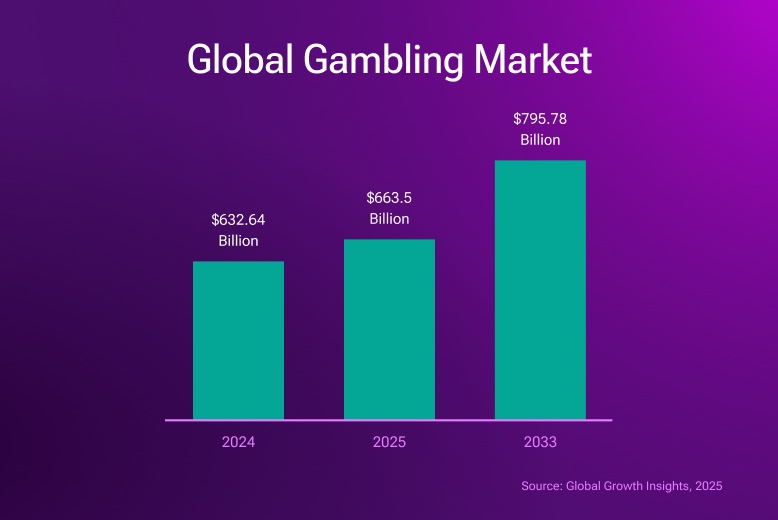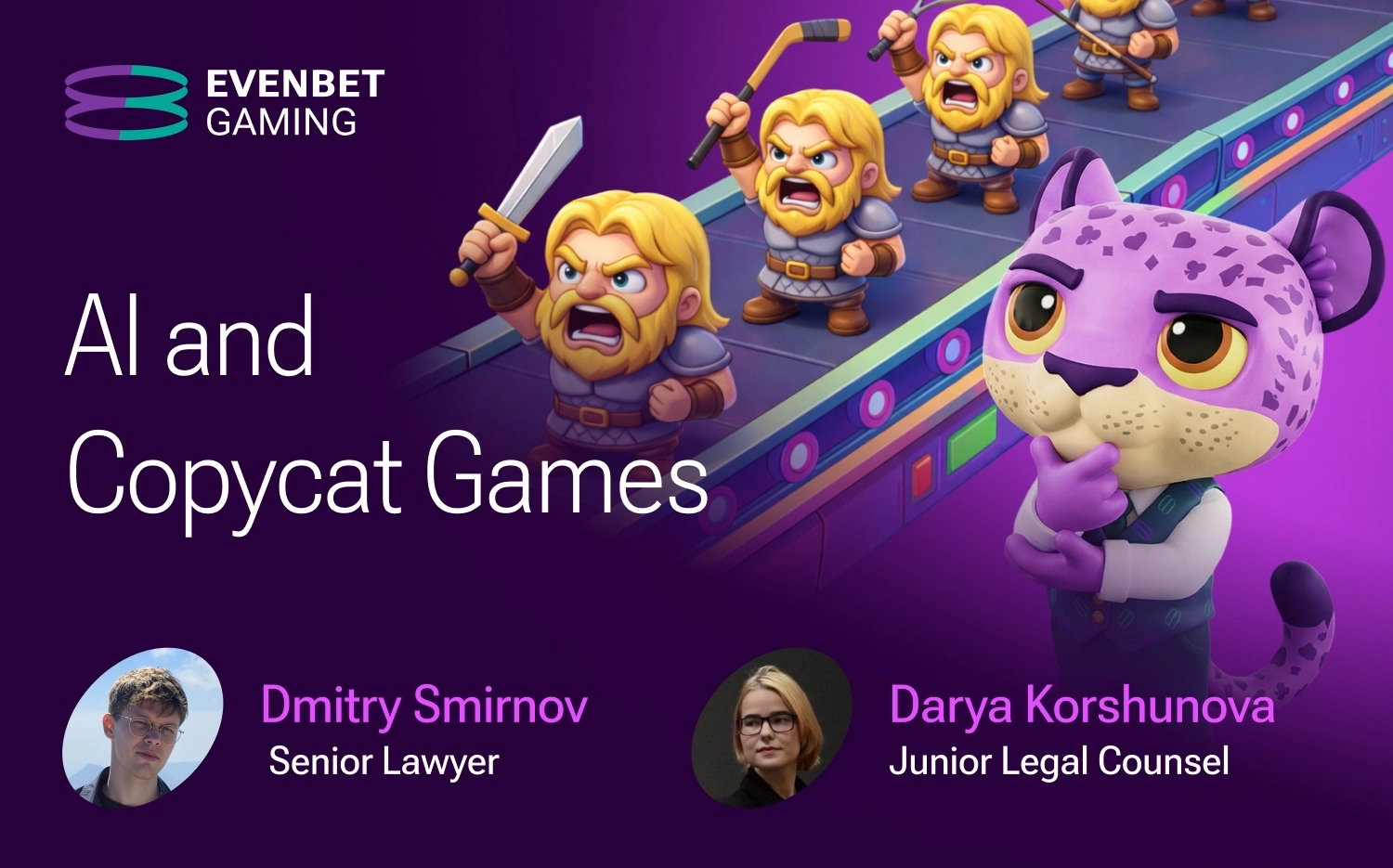For many casino and sportsbook operators, online poker still feels like a high-maintenance acquisition tool — effective for onboarding but rarely aligned with fast-paced casino experiences or high-speed gambling products. Poker is often seen as a “slow” vertical, deeply rooted in strategy, with longer sessions and more complex setup and management. That perception grows stronger as instant gaming formats, such as instant win games, crash games, and fast online games, continue to dominate the attention of casino-first audiences.
There’s also a structural barrier: poker platforms typically require different management models, dedicated infrastructure, and standalone operational teams. As a result, many casino operators avoid integrating poker altogether — despite the rising player overlap between poker, sports betting, and fast games in general.
In this article, we’ll challenge that outdated view.
We’ll examine key iGaming trends — from short-format game cycles to social betting mechanics and minimalist mobile UI — and show how poker, too, is evolving. And we’ll present a solution that doesn’t just plug poker into your funnel, but transforms it into a fully integrated, revenue-generating part of your speed games ecosystem.

The Shift Toward Short-Format Gambling Cycles
In the wider digital entertainment landscape, instant gratification is king. From swipeable short-form videos to mobile games that reward players within seconds, today’s users are conditioned to seek engagement in fast, compact formats. This demand for speed has fundamentally reshaped the way players interact with online gambling platforms.
In iGaming, this shift has translated into a growing preference for fast-paced games, short-format sessions, and mechanics that deliver instant results. Players — particularly Millennials and Gen Z — increasingly favor experiences that are quick to start, easy to understand, and tightly packed with entertainment value. In many cases, a few minutes are all they need — or want — to play.
Casino operators have responded by embracing the instant gaming model. The rise of instant win games, crash-style mechanics, and lightning-speed table games demonstrates how deeply the market has absorbed the logic of fast online games. For example, crash games — where players must cash out before a rising multiplier crashes — offer ultra-fast gameplay that fits naturally into mobile routines. With minimalist interfaces and fast resolution cycles, these games let users play multiple rounds within minutes, enhancing retention and monetization during short sessions.
The same trend is visible in sports betting. Microbetting — placing real-time wagers on the next play, point, or possession — is now a core part of modern sportsbook UX. It’s not just about betting on final outcomes anymore; it’s about engaging with the game in the moment. Every second becomes a new opportunity for action.
This evolution reflects more than just new formats. It signals a deeper change in how the instant gaming business works: short, dynamic cycles drive volume, increase user touchpoints, and align gambling behavior with the broader rhythm of digital life. For operators, these formats mean more engagement per minute — and more moments to monetize.
Social Features Are Reshaping Player Expectations
While gambling has traditionally been a solitary activity, modern iGaming is evolving into a shared, social experience. Today’s casino and sportsbook platforms are increasingly integrating features that encourage community interaction, transforming short gameplay sessions into opportunities for connection and engagement.
In-game chat, real-time leaderboards, friend-versus-friend tournaments, and integrated social media mechanics are no longer optional extras — they are becoming expected. These tools let players celebrate wins together, share betting tips, track each other’s progress, and even challenge friends directly. As a result, instant gaming becomes not just fast, but communal.
One standout example is Flutter Entertainment’s Sportsbet brand in Australia, which launched “The Feed” — a real-time betting stream where users can view friends’ wagers, react to trending bets, and follow influencers’ predictions. This type of social betting environment makes wagering feel more participatory, tapping into the same engagement patterns that power platforms like Instagram or X (Twitter). For players, the ability to connect and compete adds emotional depth to what would otherwise be just another fast game.
Social features also play a tactical role in retention. Players are more likely to return when their network is active, and when they have something to prove or share. This dynamic is particularly effective in fast-paced games and instant win games, where short play cycles create more frequent, sharable moments.
In the broader context of how the instant gaming business works, social layers help maximize user engagement within tight timeframes. They keep players inside the ecosystem longer — not by stretching game sessions, but by creating meaningful interactions between them.
Minimalist Mobile UI Is No Longer a Trend — It’s a Standard
The modern gambling session is shorter, more focused, and increasingly mobile. To meet these new behavioral patterns, the industry has undergone a decisive shift toward mobile-first, minimalist UI design — especially across products in the fast games and instant gaming segments.

In markets like Asia, where mobile usage dominates, players expect rapid-fire interfaces with minimal loading, seamless transitions, and one-tap betting flows. Navigation menus are flattened, game lobbies are reduced to visual cards, and core interactions are simplified to fit high-speed gambling products that deliver value in seconds, not minutes.
In Latin America, where device diversity is high and bandwidth varies, clean, lightweight design is not just a UX preference — it’s a necessity. Clutter-free screens, prominent call-to-action buttons, and low data consumption allow platforms to serve users regardless of device specs or connection quality.
The goal across all regions is the same: reduce friction to zero. Whether it’s placing a sports wager, spinning in a crash game, or joining an instant win game, the experience should be seamless — ideally requiring no more than two taps from launch to outcome.
The dominance of mobile is undeniable. As of 2024, over 60% of global online gamblers made transactions via smartphone, with that figure climbing to 77% in sportsbook verticals. And these numbers correlate directly with the rise of fast online games and short-format betting products, which fit naturally into on-the-go playstyles.
A minimalist UI not only improves usability — it also increases play frequency. When platforms remove barriers to entry, players are more likely to return for repeat sessions, even if each one lasts just a few minutes. In the world of instant play, micro-engagements add up quickly.
For casino and sportsbook operators, investing in mobile UX is no longer about competitive advantage. It’s about staying relevant in a market defined by fast-paced games, shrinking attention spans, and users who expect gratification at thumb’s reach.
Subscribe to our weekly email updates and get your free iGaming Future 2026 Report
Online Poker Mirrors the Rise of Fast-Format Gaming
The transformation we see across casino and sportsbook products is unfolding in online poker as well. Traditional long-form sessions — once the cornerstone of the vertical — are being replaced by fast-format gaming experiences that align with the rhythms of modern digital life.
One of the most prominent shifts is the growth of fast-fold poker (branded as Zoom, Snap, or Fast Forward depending on the platform). In these formats, players instantly receive a new hand at a new table the moment they fold — eliminating the downtime that once defined online poker. This model offers continuous action, high hand volume, and short decision cycles, making it the poker equivalent of instant play.
Spin & Go tournaments — ultra-fast, three-handed sit & go games with randomized jackpot prizes — have also redefined short-session poker. Games often conclude in under five minutes, combining poker mechanics with the adrenaline of instant win games. Their fast-paced format and low entry barrier have made them a favorite among casual players looking for excitement without time commitment.
Meanwhile, Short Deck Hold’em (also known as 6+ Hold’em) is gaining momentum, particularly in Asia and mobile-first poker apps. By removing cards below 6 from the deck, the game becomes more volatile and visually engaging. Premium hands occur more often, encouraging aggressive, action-oriented play — the very traits that resonate with audiences used to fast online games.
Although Texas Hold’em remains the dominant format globally, it’s these shorter, dynamic sub-formats that are driving new growth and expanding poker’s reach. Just as crash games and microbets reshaped player expectations in casino and sportsbook, poker is evolving to meet the same demand for speed, simplicity, and high-frequency engagement.
For operators, this shift offers a strategic opportunity. By embracing these modern poker formats, platforms can bridge the gap between poker and other fast-play verticals, creating cohesive experiences that fit seamlessly into the wider instant gaming ecosystem.
Spins Poker: Where Casino, Betting, and Poker Align
As the iGaming landscape shifts toward unified entertainment ecosystems, poker, casino, and sportsbook are no longer siloed verticals. Operators are actively seeking formats that can cross-pollinate audiences — drawing casual bettors into new products without increasing complexity or operational overhead. Fast games, jackpot multipliers, and social competition are no longer exclusive to one vertical; they’re becoming the shared language of modern platforms.
This is exactly where Spins Poker — EvenBet Gaming’s short-format poker solution — fits in.
Designed specifically for integration into existing casino and sportsbook environments, Spins Poker offers the core thrill of poker in a form that feels as intuitive and approachable as any speed game or instant win product. Each session is short, dynamic, and easy to launch — making it a natural complement to any platform focused on instant play.
Here’s how it works:
- Quick onboarding: With fast rounds and hyper-turbo structure, players don’t need deep strategy knowledge to enjoy the game. This lowers the barrier to entry for casino and sportsbook audiences used to short-session formats.
- Real skill, real satisfaction: This is still poker! Unlike slots or RNG-based instant games, Spins Poker rewards tactical thinking and psychological agility. Wins feel earned — not gifted by chance — which boosts replay value among competitive users.
- Short-session structure: Games are over in minutes, making Spins Poker ideal for break-time play, in-between sports events, or casual evening sessions — much like other fast-paced games in casino apps.
- Mobile-first, minimal UI: The interface is clean, responsive, and built for thumb-driven interaction. Yet it’s enhanced with slick animations and avatars to keep the experience visually compelling — a hallmark of modern fast online games.
- Naturally social: Poker is a head-to-head contest at its core — it doesn’t need any special features to be interactive. That built-in competitiveness fits perfectly with platforms exploring more social player engagement.
- Low operational complexity: Unlike traditional poker rooms, Spins Poker doesn’t require constant table management. Once configured, it runs smoothly in the background — like a casino mini-game.
- Security: The game’s random seating and fast resolution reduce the effectiveness of collusion or bot abuse, lowering the need for advanced anti-fraud systems.
In short, Spins Poker brings together the best of poker and the best of casino UX: it’s intelligent but accessible, fast but meaningful, and social without added overhead. For operators, it represents a frictionless way to add poker’s depth and monetization power to platforms already optimized for speed games and instant win games — no extra team or complex infrastructure required.
Conclusion
Today’s players expect speed, simplicity, and connection — and they expect it across all verticals. Fast poker formats like Spins Poker prove that poker can meet those expectations and seamlessly integrate into instant gaming environments.
At EvenBet Gaming, we help operators unlock poker’s full potential — not as a legacy product, but as a modern, fast, and revenue-generating experience.
Let’s build your next high-speed poker product — together.




























